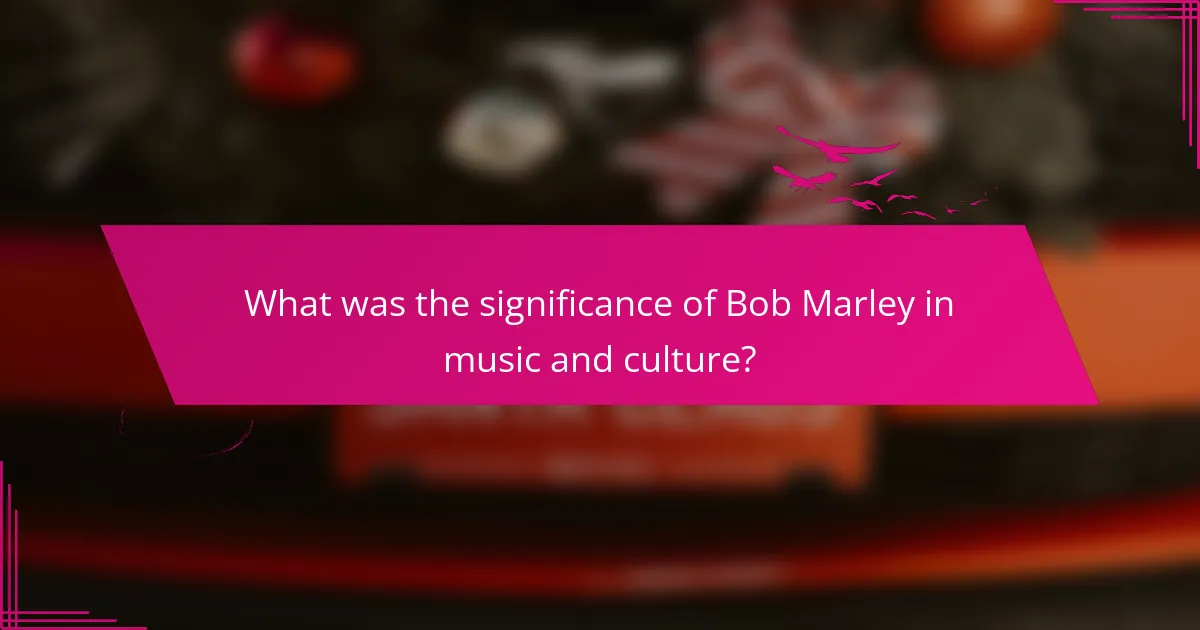Bob Marley is a key figure in music and culture, particularly known for his contributions to the reggae genre. His music promotes themes of peace, love, and social justice, with significant albums like “Exodus” and “Catch a Fire” helping to popularize reggae worldwide. Marley’s influence extends beyond music, impacting political and social movements and advocating for Rastafarian culture. His legacy endures today, inspiring contemporary artists and resonating with audiences through his powerful messages and iconic performances. The article explores Marley’s musical philosophy and cultural impact, highlighting his role as a symbol of unity and resistance against oppression.

What was the significance of Bob Marley in music and culture?
Bob Marley was a pivotal figure in music and culture, particularly in the reggae genre. His music transcended boundaries, promoting messages of peace, love, and social justice. Marley’s album “Exodus,” released in 1977, solidified his global influence. It featured hits like “One Love” and “Jamming,” which became anthems for unity. Moreover, Marley popularized Rastafarian culture worldwide. His lyrics often addressed themes of resistance against oppression and the struggles of the marginalized. Marley’s influence extended beyond music into political and social movements. He inspired generations, advocating for equality and human rights. His legacy continues to resonate in contemporary music and culture.
How did Bob Marley’s upbringing influence his musical career?
Bob Marley’s upbringing significantly shaped his musical career. He was born in rural Jamaica, which exposed him to the rich musical traditions of reggae and ska. His mixed heritage, with a white father and a black mother, influenced his perspective on race and identity. This background led him to explore themes of social justice and unity in his music.
Growing up in a poor environment, Marley experienced hardship, which fueled his passion for music as a means of expression. His early exposure to Rastafarian culture instilled in him a sense of [censured], which became a central theme in his songs.
Marley’s formative years were marked by the struggle against colonialism and oppression in Jamaica. These experiences inspired his lyrics, promoting messages of resistance and hope. His upbringing provided the foundation for his unique sound and powerful messages, making him an icon in music history.
What were the key events in Bob Marley’s early life?
Bob Marley’s early life was marked by several key events. He was born on February 6, 1945, in Nine Mile, Jamaica. His father, Norval Marley, was a British naval officer. His mother, Cedella Booker, was a Jamaican woman of African descent. Bob experienced a challenging childhood, facing racial discrimination. He moved to Kingston at age 12, where he lived in a poor neighborhood. In Kingston, he developed an interest in music. He began to pursue a career as a musician in the early 1960s. These formative experiences shaped his future as a cultural icon.
How did his cultural background shape his music?
Bob Marley’s cultural background significantly shaped his music. Growing up in Jamaica, Marley was influenced by reggae, ska, and rocksteady genres. His Rastafarian beliefs infused his lyrics with themes of [censured] and social justice. Marley’s experiences with poverty and inequality informed his messages about resistance and hope. The rich musical traditions of his homeland provided a unique sound that resonated globally. His exposure to African heritage inspired a sense of identity in his work. Collaborations with diverse artists also reflected his cultural openness. Marley’s music became a voice for the marginalized, rooted deeply in his cultural experiences.
What themes are prevalent in Bob Marley’s music?
Bob Marley’s music prominently features themes of love, social justice, and resistance. His songs often promote unity and peace among people. Love is a central theme, evident in tracks like “Is This Love.” Social justice is highlighted in songs such as “Get Up, Stand Up,” which advocates for human rights. Resistance against oppression is a recurring motif, reflecting Marley’s Rastafarian beliefs. His music also addresses [censured] and the connection to a higher power. These themes resonate deeply with listeners, contributing to his lasting cultural impact.
How does Bob Marley address social issues in his lyrics?
Bob Marley addresses social issues in his lyrics through themes of unity, resistance, and social justice. His songs often highlight the struggles against oppression and inequality. For example, “Get Up, Stand Up” encourages listeners to fight for their rights. In “Redemption Song,” he speaks about mental emancipation and freedom from colonialism. Marley also addresses poverty and injustice in “No Woman, No Cry,” reflecting on the hardships faced by marginalized communities. His lyrics resonate with messages of hope and empowerment. This approach has made his music a voice for social change and a symbol of resilience.
What role does [censured] play in Bob Marley’s work?
[censured] is a central theme in Bob Marley’s work. His music often reflects Rastafarian beliefs, which emphasize a deep connection to God and the importance of faith. Marley frequently addressed spiritual topics in his lyrics, promoting messages of love, unity, and social justice. Songs like “One Love” and “Redemption Song” highlight the quest for spiritual freedom and liberation. His commitment to [censured] influenced his lifestyle and public persona. Marley viewed music as a means to spread spiritual awareness and uplift others. He believed in the power of music to heal and inspire. This spiritual foundation remains a defining aspect of his legacy.

How did Bob Marley contribute to the reggae genre?
Bob Marley significantly contributed to the reggae genre by popularizing it worldwide. His music combined elements of rock, soul, and rhythm and blues with traditional Jamaican sounds. Marley’s album “Catch a Fire,” released in 1973, was pivotal in introducing reggae to international audiences. He infused his lyrics with themes of social justice, love, and [censured], resonating with diverse listeners. His band, The Wailers, played a crucial role in shaping the sound of reggae. Marley’s performances were characterized by their energy and message, further elevating the genre’s profile. His influence is evident in numerous artists across various genres who cite him as an inspiration. Marley’s legacy continues to shape reggae music today, making him a central figure in its history.
What are the defining characteristics of Bob Marley’s musical style?
Bob Marley’s musical style is characterized by reggae rhythms, socially conscious lyrics, and a fusion of various musical influences. Reggae rhythms are defined by offbeat guitar strumming and a steady bass line. His lyrics often address themes of love, unity, and resistance against oppression. Marley’s music incorporates elements of ska and rocksteady, showcasing his versatility. He also utilized a distinctive vocal style, marked by emotive delivery and call-and-response patterns. His collaboration with The Wailers contributed to a rich, layered sound. Marley’s influence extended globally, making reggae a prominent genre worldwide. His albums, like “Legend” and “Exodus,” solidified his legacy in music history.
How did Bob Marley innovate within reggae music?
Bob Marley innovated within reggae music by incorporating elements of rock and pop. He fused traditional reggae rhythms with melodic hooks and lyrical themes that appealed to a broader audience. Marley’s use of social and political commentary in his songs elevated reggae’s cultural significance. His album “Catch a Fire” is credited with bringing reggae to international prominence. Marley also popularized the Rastafarian message through his music, influencing artists worldwide. His unique vocal style and stage presence set new standards for live performances in reggae. This combination of musical innovation and cultural messaging helped define reggae as a global genre.
What instruments and techniques are commonly associated with his sound?
Bob Marley’s sound is commonly associated with instruments such as the guitar, bass, drums, and keyboards. The guitar often plays a crucial role in creating rhythmic patterns. The bass provides a deep foundation, enhancing the groove of reggae music. Drums contribute to the distinctive off-beat rhythm known as the one drop. Keyboards add melodic layers and harmonies, enriching the overall sound.
Techniques associated with his music include the use of syncopation and the emphasis on the off-beat. Syncopation creates a unique rhythmic feel that is central to reggae. The off-beat emphasis, often played on the guitar, is a hallmark of the genre. Additionally, vocal harmonies and call-and-response patterns are frequently utilized in his songs. These elements combine to create the signature sound that defines Bob Marley’s music.
What impact did Bob Marley have on the global music scene?
Bob Marley significantly influenced the global music scene by popularizing reggae music worldwide. His unique sound blended traditional Jamaican music with rock and blues elements. Marley’s lyrics often addressed social issues, [censured], and unity. This resonated with diverse audiences across cultures. His album “Legend” remains one of the best-selling reggae albums of all time. Bob Marley’s music brought attention to Rastafarian culture and its messages of peace and resistance. He played a crucial role in introducing reggae to mainstream audiences in the 1970s. Marley’s legacy continues to inspire artists and movements for social change globally.
How did Bob Marley popularize reggae music outside of Jamaica?
Bob Marley popularized reggae music outside of Jamaica through his global tours and impactful recordings. His album “Catch a Fire,” released in 1973, introduced reggae to international audiences. The song “No Woman, No Cry” became a defining anthem for the genre. Marley’s performances at major festivals garnered widespread attention. He collaborated with influential artists, further expanding reggae’s reach. His message of peace and resistance resonated globally, attracting diverse fans. Marley’s legacy solidified reggae as a significant musical genre worldwide.
What collaborations and performances helped elevate his influence?
Bob Marley’s collaborations and performances significantly elevated his influence in music and culture. His partnership with Peter Tosh and Bunny Wailer formed the foundation of The Wailers, which gained international recognition. The album “Catch a Fire” showcased their collective talent and introduced reggae to a broader audience.
Marley’s performance at the One Love Peace Concert in 1978 united political rivals in Jamaica, enhancing his status as a peace ambassador. Collaborations with artists like Eric Clapton, who covered “I Shot the Sheriff,” helped bring reggae music into mainstream rock.
His tours in the late 1970s, particularly in Europe and the United States, expanded his fan base and solidified his legacy. Marley’s collaboration with producer Chris Blackwell of Island Records was crucial in shaping his sound and promoting his music globally. These collaborations and performances collectively contributed to Bob Marley’s enduring influence in music and culture.

What is the legacy of Bob Marley today?
Bob Marley’s legacy today is a profound influence on music and culture worldwide. His reggae music continues to inspire artists across genres. Marley’s themes of love, peace, and social justice resonate with audiences today. The album “Legend,” released in 1984, remains a best-seller, showcasing his lasting popularity. Additionally, his advocacy for Rastafarian culture has brought global awareness to the movement. Marley’s songs are frequently used in social movements, emphasizing their relevance in contemporary issues. His image and music are celebrated in festivals and events worldwide. Bob Marley is often regarded as a symbol of unity and resistance against oppression.
How is Bob Marley’s music perceived in contemporary culture?
Bob Marley’s music is widely celebrated in contemporary culture for its messages of peace and social justice. His reggae style has influenced numerous artists across various genres. Songs like “One Love” and “Redemption Song” remain anthems for movements advocating for equality. Marley’s music is often featured in social and political contexts, reinforcing its relevance. His legacy is preserved through festivals, documentaries, and tribute concerts. The use of his music in advertisements and films further amplifies its cultural significance. Overall, Bob Marley’s music continues to resonate with new generations, promoting unity and resilience.
What are the enduring messages in Bob Marley’s songs?
Bob Marley’s songs convey enduring messages of love, unity, and social justice. His lyrics often emphasize the importance of peace and harmony among people. Marley advocates for the empowerment of marginalized communities. He addresses themes of resistance against oppression and inequality. His music promotes a sense of hope and resilience in the face of adversity. Additionally, [censured] and the Rastafarian faith are prominent in his work. Marley’s songs encourage listeners to seek freedom and liberation. His influence remains significant in promoting cultural awareness and social change.
How do current artists draw inspiration from Bob Marley?
Current artists draw inspiration from Bob Marley through his themes of social justice and unity. His music often addresses issues like inequality and oppression. This resonates with contemporary artists who aim to promote similar messages. Marley’s unique blend of reggae and soul influences modern genres. His iconic sound inspires musicians to experiment with rhythm and melody. Artists often cover his songs or reference his lyrics in their work. Collaborations with reggae artists further extend his influence. Marley’s legacy continues to shape the cultural landscape of music today.
What lessons can we learn from Bob Marley’s life and philosophy?
Bob Marley’s life and philosophy teach us the importance of unity and love. He advocated for social justice and equality through his music. His songs often addressed issues like poverty and oppression. Marley believed in the power of music to inspire change. He emphasized the significance of cultural identity and heritage. His philosophy included the idea of resilience in the face of adversity. Marley also promoted a message of hope and positivity. His legacy continues to inspire movements for peace and justice worldwide.
How can Bob Marley’s approach to music inspire new generations?
Bob Marley’s approach to music can inspire new generations through its themes of unity, love, and social justice. His songs often conveyed messages of hope and resilience. For example, “One Love” promotes harmony among people. This song resonates with today’s social movements advocating for equality. Marley’s use of reggae as a vehicle for change emphasizes cultural pride and identity. His music encourages listeners to stand against oppression and injustice. The authenticity of his lyrics connects deeply with audiences. This connection fosters a sense of community and collective action. Marley’s legacy continues to motivate artists and activists alike. His influence is evident in the ongoing relevance of his messages in modern music and culture.
What can we apply from Bob Marley’s message to today’s social issues?
Bob Marley’s message emphasizes unity and social justice, which remain relevant today. His lyrics often advocate for peace, love, and resistance against oppression. For example, songs like “One Love” call for collective action against societal divisions. Marley’s emphasis on resilience inspires movements for equality and human rights. His life exemplified the fight against systemic injustice, encouraging activism. The principles of love and understanding he promoted can guide contemporary dialogues on race, inequality, and social change. Marley’s legacy serves as a reminder of the power of music in advocating for social issues.
What are some practical ways to celebrate Bob Marley’s legacy?
Listen to Bob Marley’s music regularly. His songs convey messages of love, unity, and resistance. Attend events or festivals dedicated to reggae music. These gatherings often celebrate Marley’s influence. Organize or join community events focused on social justice. Marley’s legacy includes activism for equality and peace. Create art inspired by his music and message. This can include paintings, poetry, or dance. Support charities that align with Marley’s values. Many organizations promote social change and community development. Share Marley’s message on social media. Use platforms to educate others about his impact.
The main entity of this article is Bob Marley, a significant figure in music and culture, particularly known for his contributions to the reggae genre. The article provides an overview of Marley’s life, detailing his upbringing, key events, and cultural background that shaped his music. It explores prevalent themes in his work, such as love, social justice, and [censured], while highlighting his impact on the global music scene and the reggae genre. Additionally, the article discusses Marley’s enduring legacy, the lessons drawn from his philosophy, and practical ways to celebrate his influence today.